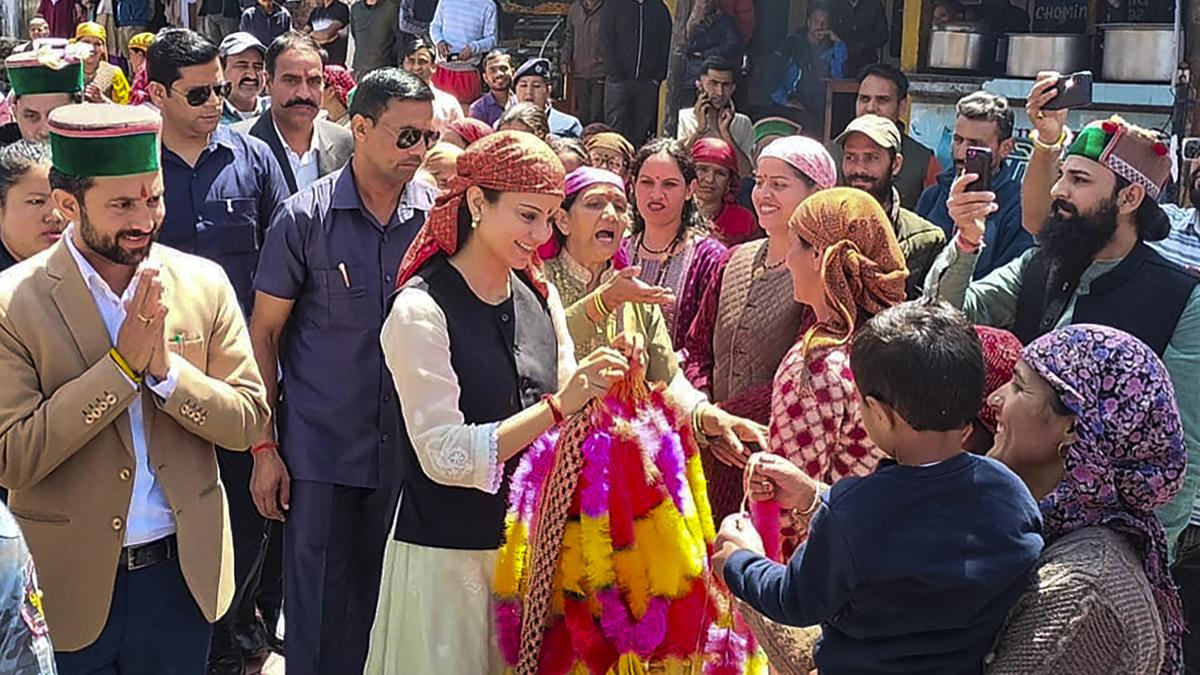
Farmers, horticulturists under SKM banner at odds with BJP’s Mandi Lok Sabha candidate Kangana Ranaut
The Hindu
Farmers in Himachal Pradesh oppose Kangana Ranaut's BJP candidacy due to alleged derogatory remarks against farmers.
Groups of farmers and horticulturists in Himachal Pradesh are up in arms against actor Kangana Ranaut, who is contesting the upcoming Lok Sabha election from Mandi constituency as a Bharatiya Janta Party (BJP) candidate.
Sanyukt Kisan Manch (SKM), an amalgamation of over two dozen farmer and horticulturist outfits of Himachal Pradesh has asked Ms. Ranaut to seek an apology from the farming community for her alleged derogatory remarks against farmers during the year-long (2020-21) farmer’s protest against the now repealed farm laws or be ready to face farmers’ ire.
Also read: Congress lands in new trouble with Shrinate’s now-deleted post on Kangana
SKM held a meeting in Shimla on Thursday to deliberate on problems being faced by farmers and horticulturists in the State. “The anti-farmer policies of the Centre government have pushed the farming community into acute crises. The input costs have been consistently rising, and farmers are fetching poor returns for their crops, yet the government continues to be ignorant. In the past five years, the Lok Sabha MPs of the BJP from Himachal never stood in support of farmers, and hence we have decided to oppose their party in the upcoming polls,” said Sanjay Chauhan, co-coordinator of SKM.
“In this series, especially, we will oppose BJP’s Lok Sabha candidate Kangana Ranaut from Mandi. During the farmers’ struggle in 2020-21 against the now-repealed farm laws, she made derogatory remarks against farmers. She should apologise for it, otherwise, we will mobilise farmers across the villages in the State to stand up against the BJP. We will expose the BJP’s and Ms. Ranaut’s anti-farmer mindset,” said Mr. Chauhan.
“We have been demanding on the basis of the formula evolved by noted agricultural scientist M.S. Swaminathan at (C2+50%) to the farmers as promised, besides imposing 100% import duty on apples and other fruits. Also, a reduction of subsidies on fertilizers, seeds, pesticides, fungicides, agricultural equipment and other input items should be stopped. We also demand the abolishment of Goods and Services Tax on all input items and packaging materials used in agriculture and horticulture. We will approach all political parties with these demands, and decide to extend our support only after their assurance of fulfillment,” he added.
The Lok Sabha election for the four parliamentary seats in Himachal Pradesh is slated for June 1.

“Writing, in general, is a very solitary process,” says Yauvanika Chopra, Associate Director at The New India Foundation (NIF), which, earlier this year, announced the 12th edition of its NIF Book Fellowships for research and scholarship about Indian history after Independence. While authors, in general, are built for it, it can still get very lonely, says Chopra, pointing out that the fellowship’s community support is as valuable as the monetary benefits it offers. “There is a solid community of NIF fellows, trustees, language experts, jury members, all of whom are incredibly competent,” she says. “They really help make authors feel supported from manuscript to publication, so you never feel like you’re struggling through isolation.”

Several principals of government and private schools in Delhi on Tuesday said the Directorate of Education (DoE) circular from a day earlier, directing schools to conduct classes in ‘hybrid’ mode, had caused confusion regarding day-to-day operations as they did not know how many students would return to school from Wednesday and how would teachers instruct in two modes — online and in person — at once. The DoE circular on Monday had also stated that the option to “exercise online mode of education, wherever available, shall vest with the students and their guardians”. Several schoolteachers also expressed confusion regarding the DoE order. A government schoolteacher said he was unsure of how to cope with the resumption of physical classes, given that the order directing government offices to ensure that 50% of the employees work from home is still in place. On Monday, the Commission for Air Quality Management in the National Capital Region and Adjoining Areas (CAQM) had, on the orders of the Supreme Court, directed schools in Delhi-NCR to shift classes to the hybrid mode, following which the DoE had issued the circular. The court had urged the Centre’s pollution watchdog to consider restarting physical classes due to many students missing out on the mid-day meals and lacking the necessary means to attend classes online. The CAQM had, on November 20, asked schools in Delhi-NCR to shift to the online mode of teaching.









